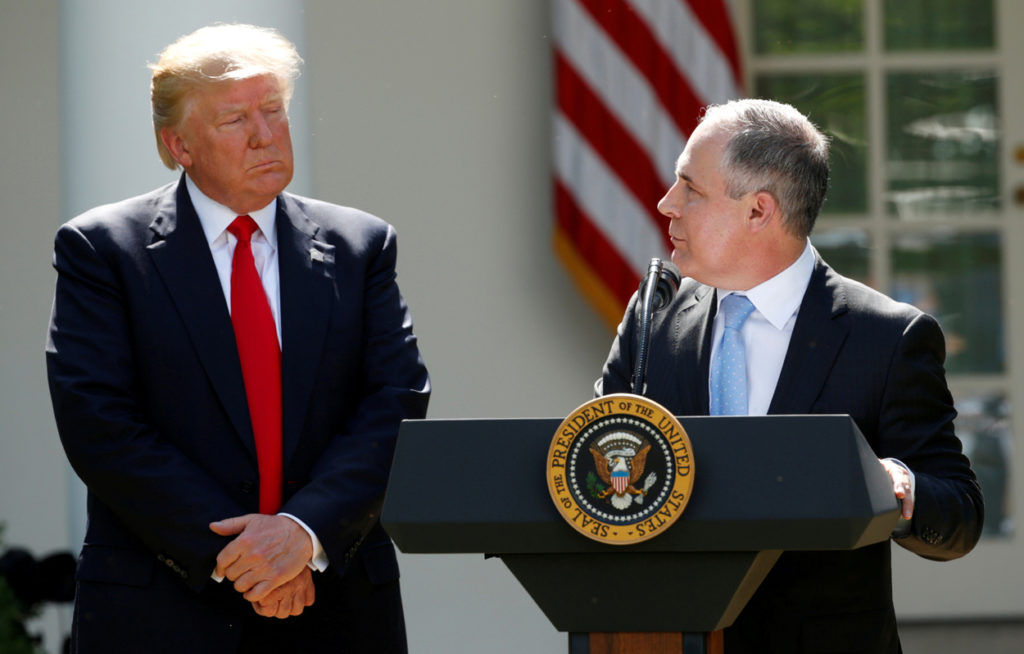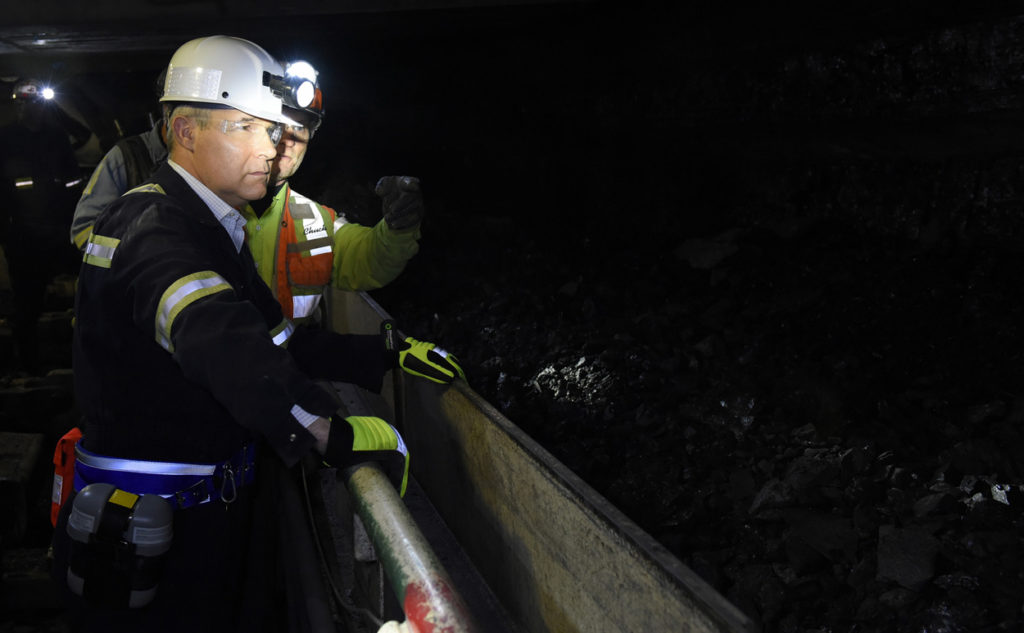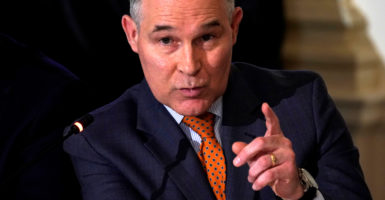In his first year as administrator of the Environmental Protection Agency, Scott Pruitt has already transformed the agency in many ways. He spoke exclusively to The Daily Signal before addressing attendees at the Conservative Political Action Conference’s annual Reagan Dinner. An edited transcript of the interview is below.
Rob Bluey: You gave a speech at CPAC last year where you were just at the beginning of your tenure at the Environmental Protection Agency, and you outlined some of the things that you wanted to do. Here we are a year later, you’ve repealed, taken back, 22 regulations at a savings at $1 billion, a significant contribution to the U.S. economy, as President Donald Trump talked about in his speech. What does that mean?
Scott Pruitt: Busy year. And it was great to be at CPAC about two weeks after having been sworn in last year. And I talked last year about the future ain’t what it used to be, that Yogi Berra quote that I cited about the change that was gonna take place at the agency and I think we’ve been about that change the last year. Focusing on rule of law, restoring process and order, making sure that we engage in cooperative federalism as we engage in regulation.
But the key to me is that weaponization of the agency that took place in the Obama administration, where the agency was used to pick winners and losers. Those days are over.
You know, to be in Pennsylvania as I was early in my term, shortly after the CPAC speech last year, and to spend time with miners in Pennsylvania and be able to share with them underground. I was a thousand feet underground and 3 miles in. First time that an administrator in history had done that, and I talked to those long wall miners in Pennsylvania, and delivered the message from the president that the war on coal is over. That was a tremendous message for them, emotion that I saw on their faces.
Can you imagine, in the first instance, an agency of the federal government, a department of the U.S. government, declaring war on a sector of your economy? Where is that in the statute? Where does that authority exist? It doesn’t. And so to restore process and restore commitment to doing things the right way, I think we’ve seen tremendous success this past year.
Bluey: President Trump cited a number of examples that have come out of EPA in his speech to the CPAC attendees, and one of them was coal, another one was the Paris climate treaty. Talk about those two issues and your work with the president in terms of why you decided to take those actions in conjunction with him?
Pruitt: The president’s decision to exit the Paris accord—tremendously courageous. When you look at that decision, it put America first, which is what the president said in the Rose Garden in June.
What was decided in Paris under the past administration was not about carbon reduction. It was about penalties to our own economy because China and India, under that accord, didn’t have to take any steps to reduce CO2 until the year 2030. So, if it’s really about CO2 reduction, why do you let that happen?
“That weaponization of the agency that took place in the Obama administration—where the agency was used to pick winners and losers—those days are over.”
When you look at who’s led the world in CO2 reduction, it’s us. From the year 2000 to 2014, we reduced our CO2 footprint almost 20 percent through innovation and technology. So, we have nothing to be apologetic about as a country, and yet, the past administration went to Paris, hat in hand, and said, “Penalize our economy”, which is what happened with the Clean Power Plan.
The president saying no to that and putting America first was the tremendously courageous and right thing to do. I’m very excited about that decision. I know he talked about that in his speech and it was a wonderful decision he made, and I think great for the American people.
Overall, this regulatory reform agenda—this regulatory certainty that we’re about—is achieving good things for the environment, but it’s also achieving, as you say, good things for our economy. We can do both. And I think that’s what’s key.

President Donald Trump listens to EPA Administrator Scott Pruitt after announcing his decision that the United States will withdraw from the Paris climate agreement. (Photo: Kevin Lamarque/Reuters/Newscom)
Bluey: President Trump certainly cited deregulation as just as significant, I believe he said, as the tax cuts. We’ve seen some of the benefits for many American businesses, and certainly American workers as a result of that.
Pruitt: When you think about an EPA—armed, weaponized, if you will—like a rule like WOTUS, the Waters of the United States rule, that would take a puddle and turn into a lake. To take land use decisions away from farmers and ranchers and landowners across this country, and people think it was just farming and ranching. It was the building of subdivisions. It was really all land use decisions.
I was in Utah last year meeting with some folks there that were building a subdivision, and there was an Army Corps of Engineers representative that was standing outside the subdivision with me, and he pointed to an ephemeral drainage ditch and he said, “Scott, that’s a water of the United States.” And I said, “Well, it’s not gonna be anymore.”
That’s exactly the kind of attitude that drove the past administration. It was all about power. It wasn’t about outcomes necessarily. It was about power and picking winners and losers, and we’re getting that corrected.
Bluey: That’s one thing I want to talk to you about because right now your agency is going across the country. You’re having hearings on the Clean Power Plan. You’re trying to get input from Americans, and not just Americans in Washington, D.C., and the Beltway, but places like Wyoming and Missouri and West Virginia. Why is that important to get out and hear from Americans about how government affects their lives?
Pruitt: Couple things: One, we’ve been to 30-plus states. And as we’ve met with stakeholders, farmers and ranchers, and those in the utility sector and the energy sector, landowners, representatives from the state’s governors, and DEQs from across the country, I think what we didn’t recognize over the last several years with the past administration is that those folks are partners. They care about outcomes.
“We shouldn’t start from the premise that those folks are adversaries or don’t care about clean air or clean water. We should start from the premise that they do, and work with them to achieve good outcomes.”
Think about those farmers and those ranchers. They’re our first conservationists. They’re our first environmentalists. I think of the young man, David, in Florida that I meant about a month ago, 12 years old. I was speaking to a group of individuals in Florida. David was there with his dad and his granddad was there. Now, think about what their greatest asset is? Their land. And they’re teaching David how to cultivate and harvest and care for that land and act as a steward.
That’s the message we’re sending across the country. We shouldn’t start from the premise that those folks are adversaries or don’t care about clean air or clean water. We should start from the premise that they do, and work with them to achieve good outcomes. That’s the difference in how we approach it versus the past administration.
Bluey: That leads to my next question. When we last spoke in October, we talked about what true environmentalism really means, and I’d like you to share again how you’re approaching that.
Pruitt: It’s a very important question because I think when you look at what is true environmentalism, the past administration said prohibition.
Though we have natural gas and oil and coal and all these natural resources that we’re blessed with as a country, they approached it by saying, “Put up fences. Do not touch.” And that’s just simply wrong-headed in my view.
What we should be about is stewardship. Recognizing that God has blessed us with those resources, that we have an obligation to use them responsibly and environmentally stewardship focused with respect to future generations, and we can do that.
This notion that we cannot be about jobs and stewardship of the environment is just simply not right. We’ve always done that well as a country. We haven’t had to choose. The past administration had to choose. Jobs or environmental protection? We’re saying environmental stewardship and jobs in the economy. We can do both together.
Bluey: One of the things I know you’ve been focused on is making the EPA, as an agency, run more efficiently. And you talked to me before about how you brought in a staff that is really committed to doing that. How has that progressed?
Pruitt: It’s exciting. Exciting. I mean permitting is one of those areas that I think is a great representation of that, a great measurement better put.
When you have a permitting processes that take 10, 12, 15 years, that’s not permitting. That’s obstruction. That isn’t an answer. That’s just simply a delay tactic in my view.
We are going through a process right now that, by the end of this year, every decision we make on a permit at the agency will be done within six months, up or down. Now, states do it all the time. States have processes in place where they’re making decisions between six months and a year, and we don’t.
“When you have a permitting processes that take 10, 12, 15 years, that’s not permitting. That’s obstruction.”
We’re getting accountability across the country in regions and in headquarters, and it’s gonna be done by the end of the year.
That’s something that is very exciting to me, but when you think about the core mission of our agency, we’ve done something else that’s very important. We’re setting goals.
We’re saying, “Where do we wanna be air attainment?” Those air quality standards that we have, where do we need to be five years from now? What about Superfund sites? What about water infrastructure? How do we avoid a Flint, Michigan, and a Gold King, Colorado? How do we take the backlog of chemicals? How do we address the state of limitation plans that states have submitted to improve air quality, and work through that backlog?
Let’s set objective measurements and measure them every single day, and challenge everyone to meet those goals. And it’s exciting. And people are really, I think, getting vested and invested in it.

EPA Administrator Scott Pruitt watches an underground conveyor belt system carrying coal to the surface during a tour of the Harvey Mine in Sycamore, Pennsylvania. Pruitt was visiting the area as part of his Back-to-Basics Agenda promoting coal as a source of energy. (Photo: Eric Vance/ZUMA Press/Newscom)
Bluey: Last fall, you took action on sue and settle. You decided to end that practice. What has that meant in the months since you’ve taken that action?
Pruitt: Well, Rob, you get this, but how damaging was that to rulemaking when the sue and settle practice—a third-party group comes in and sues the agency, goes into a courtroom somewhere in the country, agrees to a substantive rule in the course of that settlement, puts it into consent decree, and then goes all over the country and says, “This is what you have to do across the country.”
Now, that’s abusive. That’s not how the process should work. You should not have a sue and settle process to bypass rulemaking. So, I ended it.
I sent a memo out to the entire agency that said gone are the days of us going into a backroom at a courtroom, and make a decision with one party that affects the entire country.
We’re going to do rulemaking the right way. We’re going to publish our rules. We’re going to take comment on those rules. We’re going to respond to those comments. We’re going to finalize the rules. That’s what Congress has required of us. That’s what we’re going to do. It’s going to make a substantial difference.
“This notion that we cannot be about jobs and stewardship of the environment is just simply not right. … We can do both together.”
One other area that we’ve addressed that I think is equally important is this area of our advisory committees. These scientists that serve on advisory committees that help us do rulemaking because, as you know, when we make a decision, we don’t just snap our finger. We have to build a record. There’s scientific inquiry. There’s evaluation, data, methodology. All of those things take place with water, air, whatever the rulemaking is.
As that record is built, you have advisory committees, you have scientists that advise me as the administrator and the agency as a whole on the efficacy, the merits of that rule. Well, those scientists, we have many scientists that serve on those advisory committees that were also getting grants from the agency that were supposed to be given as independent counsel. In fact, we had several scientists receive almost $77 million over the last three years.
I said to those individuals, “Look, you can receive the grant, but you can’t serve on the advisory committee. Or you can serve on the advisory committee but not receive the grant. Choose this day what you’re going to do.”
We got accountability there to ensure the independence of the scientific basis by which we were doing rulemaking. That’s the process changes we’re engaged in that I think lead to good results at the end, and it’s what the American people deserve.
Bluey: Follow up to that last point you made. I know that when you announced that change, obviously there was a big uproar in the media and among those people who didn’t like the fact that you were trying to make this change. What have the results been in the months that followed?
Pruitt: Common sense is not too common, and so, I think when we make those kind of commonsense changes it’s disruptive to the status quo, but frankly, the status quo needs to be disrupted in these areas.
“Common sense is not too common, and so, I think when we make those kind of commonsense changes it’s disruptive to the status quo, but frankly, the status quo needs to be disrupted in these areas.”
We’re getting good accountability, good transparent outcomes. The other thing that’s just amazing to me is that the agency historically, as it’s done rulemaking, it contracts studies to third parties. It doesn’t do the science itself in some instances, it goes to a third party and says, “You do the science for us, give us the findings.” But then when the findings come back to the agency, they don’t provide the methodology, nor do they provide the data. And so there’s no transparency in that process. We’re going to get accountability there as well.
These matters, at the end of the day, I think are what we should be focused upon. As we do our work, do it with a commitment to transparency and objectivity, making sure that we have a record that is solid, and in making informed decisions about the rules that we’re passing so that the American people have a voice, and that we know how it’s going to impact positively the environment, but also the cost-benefit aspect.
Bluey: Speaking at the Reagan Dinner at CPAC is a real honor. There have been many who’ve come before you and had this opportunity to address the audience. What message do you want to leave the CPAC attendees this year?
Pruitt: This first year as I’ve served, and as the president has served this country, he’s a person of results.
You think about the State of the Union. His message that night was powerful. I think it was very powerful. But it was powerful because he said look what we’ve accomplished this past year. Look what we promised, look what we’ve done, look at the impact it’s having on the economy. And look what’s going to happen as we go into 2018.
I love how the president leads with a commitment to getting results. And I think the American people, as I serve in this capacity, we’ve got to focus on what. Key objectives that we want to achieve for the environment. Air, land, water, removing solid waste and hazardous wastes.
“Look what we promised, look what we’ve done, look at the impact it’s having on the economy.”
What are our objectives? Let’s focus on those to address all those very good things for the environment. But let’s also recognize that we have to have an attitude that says we can be about natural resource management and environmental stewardship, that we don’t have to choose. That’s one of the greatest challenges we have as a country. We need to get that question right and that answer right because we have so much opportunity.
It’s an exciting time to be serving. There’s wonderful things happening. And this country, I’m telling you, the growth that we’re seeing, it’s only the beginning. As we get together next year, which I pray we do, we’re going to celebrate another year of progress.
You talk about those 22 actions of $1 billion [at the EPA], $8 billion as a total for the administration. That’s really quite amazing. We’re going to see that continue through courageous leadership, and focus on getting results.




























